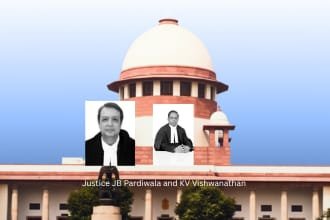The Punjab and Haryana High Court has ruled that a private vehicle cannot be searched in a public place without adhering to Sections 41(1) and 42(2) of the Narcotic Drugs and Psychotropic Substances Act, 1985 (NDPS Act) when secret information is received. The judgment came in an appeal filed by the Punjab government challenging the acquittal of accused individuals by the Special Court.
A Division Bench of Justice Gurvinder Singh Gill and Justice Jasjit Singh Bedi clarified that the search of a private conveyance in a public area requires compliance with Section 42, which mandates that secret information must be recorded in writing and communicated to a superior officer within 72 hours. However, if a public conveyance is searched in a public place, compliance with Section 42 is not necessary.
Case Background – Punjab & Haryana HC
An FIR was registered in 2000 when the police set up a checkpoint at a bus stop and received secret information about a truck transporting a large quantity of smack and poppy husk hidden under sacks of groundnuts. The police stopped the truck and, after obtaining the occupants’ consent, conducted a search, recovering 30 bags of poppy husk.
During the trial, the Special Court acquitted the accused on the grounds that the secret information had not been recorded in writing or sent to a superior officer as required under Section 42 of the NDPS Act. The Punjab government challenged this acquittal before the High Court.
Key Legal Issue
The central issue before the High Court was whether a private vehicle searched in a public place should be governed by Section 42 or Section 43 of the NDPS Act.
- Section 42 applies when secret information is received about a narcotics offense, requiring the officer to record it in writing and inform a superior officer before conducting the search.
- Section 43 applies to searches conducted in public places, including public conveyances, and does not mandate prior documentation or notification to a superior officer.
Also Read: Supreme Court Issues Notice to CBIC Over GST Rectification Deadlines
Court’s Analysis and Ruling
The High Court referred to the Supreme Court’s ruling in M. Prabhulal v. State of Rajasthan, which held that when a Gazetted Officer receives secret information, he must record it in writing and conduct the search himself or authorize a subordinate. However, he is not required to send this information to a superior officer.
The Court distinguished between searches of private and public vehicles:
- If a private vehicle is searched in a public place based on secret information, Section 42 applies, requiring written documentation and notification to a superior officer.
- If a public conveyance is searched in a public place, Section 43 applies, and compliance with Section 42 is not necessary.
The Court emphasized that public places and private premises are treated differently under the NDPS Act. If a private vehicle is parked in a private area, Section 42 applies fully, granting additional legal protections.
While there was some ambiguity regarding which officer received the secret information, the Court found this irrelevant since the Deputy Superintendent of Police (DSP) was present at the checkpoint. Although he failed to record the information in writing, he was not required to notify a superior officer as per Section 41(2) of the NDPS Act.
Final Verdict
The High Court upheld the Special Court’s acquittal, ruling that the non-compliance with Section 42 was a critical lapse that rendered the prosecution’s case unsustainable. The Court dismissed the state’s appeal.
Legal Implications
This ruling reinforces the principle that:
- Strict procedural compliance is necessary in NDPS cases, especially regarding searches based on secret information.
- Searches of private vehicles require prior documentation and communication to superior officers, even in public places.
- Failure to follow NDPS Act procedures can lead to acquittals, even if narcotics are recovered.


